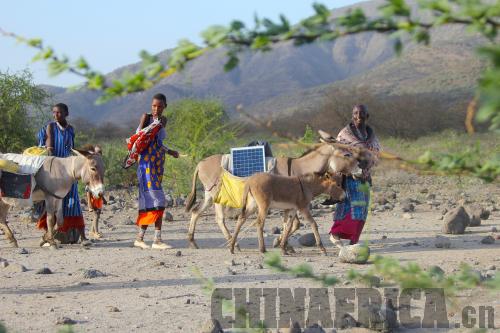| 
Maasai women deliver clean energy on donkey-back to rural Kenya
The [solar-powered] light scares the hyenas away, so we don't have to worry about losing our [domestic] animals at night.
Jacklyn Naiputa, solar energy entrepreneur, south Kenya
For Jacklyn Naiputa, the dark days and nights of the past are over, literally.
Naiputa, who is from Ol Donyo Nyoki, a village in Kajiado County, south Kenya, and other ethnic Maasai women are part of an initiative which is joining solar energy collectives in villages not only to gain economic freedom but also light up far-flung villages and improve the quality of life.
The women in these collectives purchase energy-efficient lights, solar panels and rechargeable batteries at a discounted rate from Green Energy Africa (GEA), a Kenyan social enterprise that initiated the Women Entrepreneurship in Renewable Energy Project (WEREP) last year. They then take the purchases on donkey-back from village to village, selling them for a slender profit.
The solar panels, for instance, fetch a profit of 300 Kenyan shillings (around $3) each. GEA also trains the women how to install the panels and lights in village homes.
"For us, the merits of solar-powered lamps are unimaginable," Naiputa said, describing the changes solar panels have brought to the lives of people who had been living without electricity. "The nearest market where one can charge cellphones or buy kerosene (for lights and cooking) is 20 km away and [held] only once a week."
Low-cost lighting
Solar energy is the optimal energy source for the nomadic-pastoral Maasai tribe. The installation system can be sized to fit any need, from household lights and businesses to lighting up an entire village, which also helps ward off predators preying on their livestock.
"The [solar-powered] light scares the hyenas away, so we don't have to worry about losing our [domestic] animals at night," Naiputa said.
Earlier, the Naiputas used to spend 40 Kenya shillings ($0.4) per day on 300 ml of kerosene, and up to $0.5 charging a cellphone, which is expensive by rural Kenya standards. Naiputa also runs a small shop in her village, stocking solar panels, rechargeable batteries, solar lamps and cables.
Maasai women traverse the countryside with their donkeys to purchase kits from shops like Naiputa's, trek overland to teach other nomads about the solar items, then sell and install them. The WEREP works with 700 women like Naiputa and 150 of them retail solar panels and lights. Nearly 200 women make between $145 and $193 a month as installers.
Installing solar devices from village to village also means the women are illuminating rural Kenya and paving a path to financial stability. Additionally, the solar collectives transform gender stereotypes: women who previously traveled long distances to buy kerosene and charge their phones are now formally employed and have become vital components in the economies of their homes.
"The WEREP program provides training on the benefits of solar energy, and an
understanding of the basic steps of starting to grow a business," said GEA's Aisha Germaine. "GEA addresses unemployment and poverty by supporting the creation and expansion of business enterprises."
Solar energy frontrunner
The WEREP initiative began when GEA founder and CEO Edwin Kinyatti saw the potential to solve both the energy deficit in rural Kenya and provide employment to the women living there.
A 2014 study by M-KOPA Solar, a Nairobi-based organization providing affordable solar lighting and mobile charging to rural Kenyans on a pay-as-you-go basis, found Kenya has emerged as a frontrunner for off-grid solar energy, with 14 percent of the population surveyed using solar as their primary lighting and charging source. Kenya Power and Lighting Co., the national electricity provider, estimates that while 30 percent of the population has access to the national electricity grid, only 5 percent of rural communities are connected.
Compared to other African markets, Kenya is a leader in off-grid power. Kenya has great untapped solar potential and the renewable energy sector is expected to get a boost with a solar micro-grid company, Powerhive East Africa, beginning to sell power from September, ending half a century's monopoly by the state electricity firm.
The customs of some nomadic tribes don't allow women to own property, but now, the Maasai "solar warriors" are putting the power of solar energy in women's hands.
The WEREP program is being piloted in the Makueni and Kajiado counties, which are populated primarily by the Maasais and Akambas, communities that live with sweeping power shortages.
Women like Naiputa are participating in the WEREP project across five village groups. Together, they've installed solar-powered units in more than 2,000 homes.
(Reporting from South Africa)
|